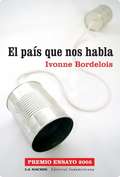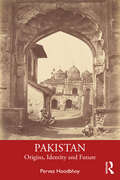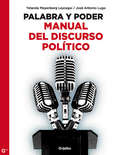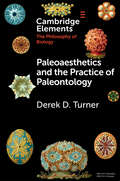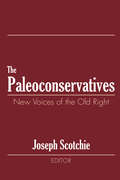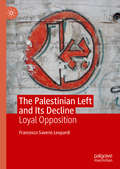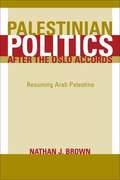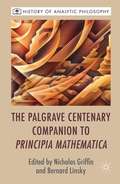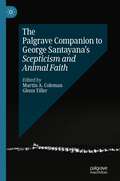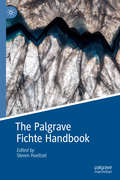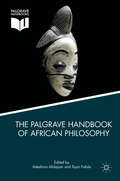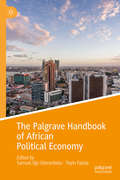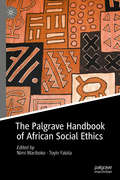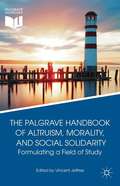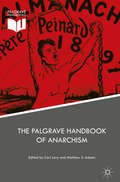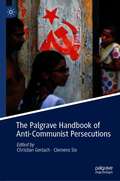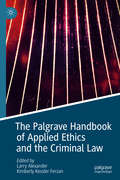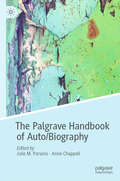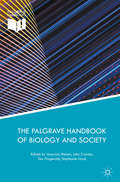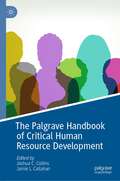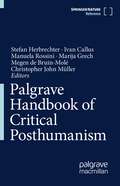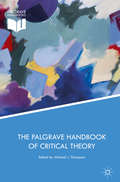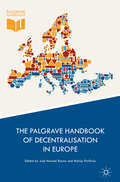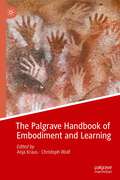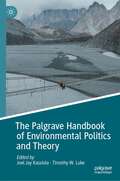- Table View
- List View
PAIS QUE NOS HABLA, EL (EBOOK)
by Ivonne BordeloisCuáles son los peligros y las amenazas que nos acechan en relación con esa riqueza fundamental de todo pueblo que es su lengua? Qué podemos hacer para conjurarlos? La campaña de devastación verbal que realizan los medios nos prepara para ser zombies de la sociedad de consumo y nos priva de la riqueza del idioma, que no sólo es comunicación sino sabiduría e identidad. El país que nos habla, de Ivonne Bordelois, intenta señalar un camino en ese sentido.
Pakistan: Origins, Identity and Future
by Pervez HoodbhoyThis book is an accessible, comprehensive, and nuanced history of Pakistan. It reflects upon state and society in Pakistan and shows they have been shaped by historical forces and personae. Hoodbhoy expertly maps the journey of the region from many millennia ago to the circumstances and impulses that gave birth to the very first state in history founded upon religious identity. He documents colonial rule, the trauma of Partition, the nation’s wars with India, the formation of Bangladesh, and the emergence of Baloch nationalism. The book also examines longstanding complex themes and issues – such as religious fundamentalism, identity formation, democracy, and military rule – as well as their impact on the future of the state of Pakistan. Drawing on a range of sources and written by one of the foremost intellectuals of the region, this book will be indispensable for scholars, researchers, students of history, politics, and South Asian studies. It will be of great interest to the general reader interested in understanding Pakistan.
Palabra y poder:
by Yolanda Meyemberg LeyceguiEl discurso político tiene el objetivo fundamental de persuadir a un grupo social para que realice un acto determinado: emitir un voto, avalar una política específica, refrendar una iniciativa, etcétera. Por ello, un discurso eficaz requiere estar construido sobre una base retórica que garantice la implantación del mensaje en la mente del receptor; esto es, que lo convenza de sus argumentos el emisor. El discurso es también un instrumento de legitimación política, fundamental para conocer las posiciones ideológicas de los líderes sociales, de la propia sociedad y de los medios de comunicación. Su vigencia a lo largo de la historia como medio persuasivo tiene que ver con la eficacia con la que logra sus fines: desde la antigua Grecia hasta la actualidad los escritores de discursos han recurrido a diversa técnicas comunicativas tanto para organizarlos como para pronunciarlos ante un ágora determinada. Palabra y poder: Manual del discurso político es una herramienta que proporciona reglas y conceptos prácticos para elaborar un discurso claro, ordenado y eficaz. La obra está dirigida a quienes desempeñan la difícil tarea de redactar los mensajes que de manera cotidiana pronuncian los políticos en la arena pública. Los autores, Yolanda Meyenberg y José Antonio Lugo, han dedicado parte de su vida profesional a la construcción de discursos como piezas retóricas cuya finalidad es informar sobre los actos de gobierno, afianzar la imagen de la autoridad y legitimar sus acciones. Así, al finalizar la lectura de este libro, el lector será capaz de elaborar un discurso de calidad, no sólo en cuanto a su aspecto literario, sino también en relación con la solidez de sus argumentos retóricos.
Paleoaesthetics and the Practice of Paleontology (Elements in the Philosophy of Biology)
by Derek D. TurnerThe practice of paleontology has an aesthetic as well as an epistemic dimension. Paleontology has distinctively aesthetic aims, such as cultivating sense of place and developing a better aesthetic appreciation of fossils. Scientific cognitivists in environmental aesthetics argue that scientific knowledge deepens and enhances our appreciation of nature. Drawing on that tradition, this Element argues that knowledge of something's history makes a difference to how we engage with it aesthetically. This means that investigation of the deep past can contribute to aesthetic aims. Aesthetic engagement with fossils and landscapes is also crucial to explaining paleontology's epistemic successes.
The Paleoconservatives: New Voices of the Old Right
by Joseph A. Scotchie"Paleoconservatism" as a concept came into circulation during the 1980s as a rejoinder to the rise of neoconservatism. It signifies a brand of conservatism that rose up in opposition to the New Deal, setting itself against the centralizing trends that define modern politics to champion the republican virtues of self-governance and celebrate the nation's varied and colorful regional cultures. This volume brings together key writings of the major representatives of "Old Right" thought, past and present. The essays included here define a coherent intellectual tradition linking New York libertarians to unreconstructed Southern traditionalists to Midwestern agrarians. Part I is devoted to the founding fathers of the modern conservative movement. Essays by Frank Chodorov, Murray Rothbard, and James Burnham attack economic aspects of the New Deal, big government in general, and high taxes. Russell Kirk introduces the cultural paleoconservatism, with its preference for social classes and distinctions of age and sex, while Richard Weaver explains why culture is more important to a civilization's survival than mere material conditions. The second part covers the contemporary resurgence of the Old Right. Chilton Williamson, Jr. sets out the argument against large-scale immigration on cultural and economic grounds. The divisive issue of trade is covered. William Hawkins outlines a mercantilist trade policy at odds with the free trade libertarianism of Chodorov and Rothbard. On education, Allan Carlson goes further than the Beltway Right in his advocacy of home schooling. M.E. Bradford shows how the doctrine of equality of opportunity inevitably leads to greater and more tyrannical state action. The contemporary culture wars are the focus of Thomas Fleming, Paul Gottfried, Clyde Wilson, and Samuel Francis, who search for the roots of American nationalism, the lessons to be drawn from the past, and how they may be applied in the future.
The Palestinian Left and Its Decline: Loyal Opposition
by Francesco Saverio LeopardiThis book examines the history of the Palestinian Left by focusing on the trajectory of the Popular Front for the Liberation of Palestine (PFLP) during its declining phase. Relying on a substantial corpus of primary sources, this study illustrates how the PFLP’s political agency contributed to its own marginalisation within the Palestinian national movement. Following the 1982 eviction of the Palestine Liberation Organisation (PLO) from Lebanon, the bases of the PFLP’s opposition to Fatah’s primacy in the national movement were jeopardised. This book argues that the PFLP’s «loyalty» to the PLO institutional and political framework prevented the formulation of a real counterhegemonic political project. This drove the PFLP’s action to suffer a fundamental contradiction undermining its stance within the national movement. In the attempt to continue its opposition to Fatah, while maintaining integration in the Palestinian mainstream, the PFLP’s agency fluctuated, compromising its effectiveness and credibility. Apparently irreversible, the PFLP’s marginalisation is a factor fostering the current Palestinian impasse, as no alternative is emerging to break the thirteen-year long Hamas-Fatah polarisation.
Palestinian Politics after the Oslo Accords: Resuming Arab Palestine
by Nathan J. BrownThis timely and critically important work does what hostilities in the Middle East have made nearly impossible: it offers a measured, internal perspective on Palestinian politics, viewing emerging political patterns from the Palestinian point of view rather than through the prism of the Arab-Israeli conflict.
The Palgrave Centenary Companion To Principia Mathematica
by Nicholas Griffin Bernard LinskyTo mark the centenary of the 1910 to 1913 publication of the monumental Principia Mathematica by Alfred N. Whitehead and Bertrand Russell, this collection of fifteen new essays by distinguished scholars considers the influence and history of PM over the last hundred years.
The Palgrave Companion to George Santayana’s Scepticism and Animal Faith (Palgrave Companions)
by Martin A. Coleman Glenn TillerThe first of its kind, this project is a collection of critical and interpretive essays on George Santayana’s seminal work in American philosophy, Scepticism and Animal Faith (1923), 100 years after its first edition. The reader will be guided through the intricacies of Scepticism and Animal Faith by expert scholars. This book is a companion to Scepticism and Animal Faith for both first-time readers and readers intimately familiar with this work.
The Palgrave Fichte Handbook (Palgrave Handbooks in German Idealism)
by Steven HoeltzelThis Handbook provides a comprehensive single-volume treatment of Fichte’s philosophy. In addition to offering new researchers an authoritative introduction and orientation to Fichtean thought, the volume also surveys the main scholarly and philosophical controversies regarding Fichtean interpretation, and defends a range of philosophical theses in a way that advances the scholarly discussion. Fichte is the first major philosopher in the post-Kantian tradition and the first of the great German Idealists, but he was no mere epigone of Kant or precursor to Hegel. His work speaks powerfully and originally to a wide range of issues of enduring concern, and his many innovations importantly anticipate major developments, including absolute idealism, phenomenology, and existentialism. He is therefore not only a path-breaking thinker but also a pivotal figure in Western intellectual history. Wide-ranging, well-organised and timely, this key volume makes Fichte’s work both accessible and relevant. It is essential reading for scholars, graduate researchers and advanced students interested in Fichte, German Idealism, and the history of nineteenth-century philosophy in the West.
The Palgrave Handbook of African Philosophy
by Adeshina Afolayan Toyin FalolaThis handbook investigates the current state and future possibilities of African Philosophy, as a discipline and as a practice, vis-#65533;-vis the challenge of African development and Africa's place in a globalized, neoliberal capitalist economy. The volume offers a comprehensive survey of the philosophical enterprise in Africa, especially with reference to current discourses, arguments and new issues--feminism and gender, terrorism and fundamentalism, sexuality, development, identity, pedagogy and multidisciplinarity, etc. --that are significant for understanding how Africa can resume its arrested march towards decolonization and liberation.
The Palgrave Handbook of African Political Economy (Palgrave Handbooks in IPE)
by Toyin Falola Samuel Ojo OloruntobaThis handbook constitutes a specialist single compendium that analyses African political economy in its theoretical, historical and policy dimensions. It emphasizes the uniqueness of African political economy within a global capitalist system that is ever changing and complex. Chapters in the book discuss how domestic and international political economic forces have shaped and continue to shape development outcomes on the continent. Contributors also provoke new thinking on theories and policies to better position the continent’s economy to be a critical global force. The uniqueness of the handbook lies in linking theory and praxis with the past, future, and various dimensions of the political economy of Africa.
The Palgrave Handbook of African Social Ethics
by Toyin Falola Nimi WaribokoThis Handbook provides a robust collection of vibrant discourses on African social ethics and ethical practices. It focuses on how the ethical thoughts of Africans are forged within the context of everyday life, and how in turn ethical and philosophical thoughts inform day-to-day living. The essays frame ethics as a historical phenomenon best examined as a historical movement, the dynamic ethos of a people, rather than as a theoretical construct. It thereby offers a bold, incisive, and fresh interpretation of Africa’s ethical life and thought.
The Palgrave Handbook Of Altruism, Morality, And Social Solidarity
by Vincent JeffriesThe study of altruism, morality, and social solidarity is an emerging field of scholarship and research in sociology. This handbook will function as a foundational source for this subject matter and field, and as an impetus to its further development.
The Palgrave Handbook of Anarchism
by Matthew S. Adams Carl LevyThis handbook unites leading scholars from around the world in exploring anarchism as a political ideology, from an examination of its core principles, an analysis of its history, and an assessment of its contribution to the struggles that face humanity today. Grounded in a conceptual and historical approach, each entry charts what is distinctive about the anarchist response to particular intellectual, political, cultural and social phenomena, and considers how these values have changed over time. At its heart is a sustained process of conceptual definition and an extended examination of the core claims of this frequently misunderstood political tradition. It is the definitive scholarly reference work on anarchism as a political ideology, and should be a crucial text for scholars, students, and activists alike.
The Palgrave Handbook of Anti-Communist Persecutions
by Christian Gerlach Clemens SixThis handbook explores anti-communism as an overarching phenomenon of twentieth-century global history, showing how anti-communist policies and practices transformed societies around the world. It advances research on anti-communism by looking beyond ideologies and propaganda to uncover how these ideas were put into practice. Case studies examine the role of states and non-state actors in anti-communist persecutions, and cover a range of topics, including social crises, capitalist accumulation and dispossession, political clientelism and warfare. Through its comparative perspective, the handbook reveals striking similarities between different cases from various world regions and highlights the numerous long-term consequences of anti-communism that exceeded by far the struggle against communism in a narrow sense. Contributing to the growing body of work on the social history of mass violence, this volume is an essential resource for students and scholars interested to understand how twentieth-century anti-communist persecutions have shaped societies around the world today.Chapter 7 is available open access under a Creative Commons Attribution 4.0 International License via link.springer.com.
The Palgrave Handbook of Applied Ethics and the Criminal Law
by Larry Alexander Kimberly Kessler FerzanThis handbook consists of essays on contemporary issues in criminal law and their theoretical underpinnings. Some of the essays deal with the relationship between morality and criminalization. Others deal with criminalization in the context of specific crimes such as fraud, blackmail, and revenge pornography. The contributors also address questions of responsible agency such as the effects of addiction or insanity, and some deal with punishment, its mode and severity, and the justness of the state’s imposition of it. These chapters are authored by some of the most distinguished scholars in the fields of applied ethics, criminal law, and jurisprudence.
The Palgrave Handbook of Auto/Biography
by Julie M. Parsons Anne ChappellIn a neo-liberal era concerned with discourses of responsible individualism and the ‘selfie’, there is an increased interest in personal lives and experiences. In contemporary life, the personal is understood to be political and these ideas cut across both the social sciences and humanities.This handbook is specifically concerned with auto/biography, which sits within the field of narrative, complementing biographical and life history research. Some of the contributors emphasise the place of narrative in the construction of auto/biography, whilst others disrupt the perceived boundaries between the individual and the social, the self and the other. The collection has nine sections: creativity and collaboration; families and relationships; epistolary lives; geography; madness; prison lives; professional lives; ‘race’; and social justice and disability. They illustrate the inter- and multi-disciplinary nature of auto/biography as a field. Each section features an introduction from a section editor, many of whom are established researchers and/or members of the British Sociological Association (BSA) Auto/Biography study group. The handbook provided the reader with cutting-edge research from authors at different stages in their careers, and will appeal to those with an interest in auto/biography, auto-ethnography, epistolary traditions, lived experiences, narrative analysis, the arts, education, politics, philosophy, history, personal life, reflexivity, research in practice and the sociology of the everyday.
The Palgrave Handbook of Biology and Society
by Maurizio Meloni John Cromby Des Fitzgerald Stephanie LloydThis comprehensive handbook synthesizes the often-fractured relationship between the study of biology and the study of society. Bringing together a compelling array of interdisciplinary contributions, the authors demonstrate how nuanced attention to both the biological and social sciences opens up novel perspectives upon some of the most significant sociological, anthropological, philosophical and biological questions of our era. The six sections cover topics ranging from genomics and epigenetics, to neuroscience and psychology to social epidemiology and medicine. The authors collaboratively present state-of-the-art research and perspectives in some of the most intriguing areas of what can be called biosocial and biocultural approaches, demonstrating how quickly we are moving beyond the acrimonious debates that characterized the border between biology and society for most of the twentieth century. This landmark volume will be an extremely valuable resource for scholars and practitioners in all areas of the social and biological sciences. Chapter 37 of this book is open access under a CC BY 4. 0 license via link. springer. com.
The Palgrave Handbook of Critical Human Resource Development
by Joshua C. Collins Jamie L. CallahanThis handbook presents an expansive exploration of critical theory, critical perspectives, critical praxis, and the impact on the research, theory, and practice of Human Resource Development (HRD). Critical Human Resource Development (CHRD) aims to challenge the normative structures, practices, policies, definitions, and approaches which have historically dominated the field of Human Resource Development (HRD). As an approach to HRD, CHRD raises awareness of social systems, organizational policies and practices, and research paradigms that silence new ways of knowing and understanding, while advancing underrepresented and emerging approaches. Through an analysis of power and privilege, morality and ethics, and ideology and context, CHRD situates diversity, equity, inclusion, social justice, and resistance as a path forward in a rapidly-changing global society. In contrast to HRD’s traditional focus on organization development, training and development, and career development, this handbook adopts a more critical vantage point which classifies the scope and outcomes of HRD across five domains identified by CHRD scholars as key to understanding the nature and work of the field— organizing, relating, learning, changing, and advocating.
Palgrave Handbook of Critical Posthumanism
by Stefan Herbrechter Ivan Callus Manuela Rossini Marija Grech Megen de Bruin-Molé Christopher John MüllerPalgrave Handbook of Critical Posthumanism is a major reference work on the paradigm emerging from the challenges to humanism, humanity, and the human posed by the erosion of the traditional demarcations between the human and nonhuman. This handbook surveys and speculates on the ways in which the posthumanist paradigm emerged, transformed, and might further develop across the humanities. With its focus on the posthuman as a figure, on posthumanism as a social discourse, and on posthumanisation as an on-going historical and ontological process, the volume highlights the relationship between the humanities and sciences. The essays engage with posthumanism in connection with subfields like the environmental humanities, health humanities, animal studies, and disability studies. The book also traces the historical representations and understanding of posthumanism across time. Additionally, the contributions address genre and forms such as autobiography, games, art, film, museums, and topics such as climate change, speciesism, anthropocentrism, and biopolitics to name a few. This handbook considers posthumanism’s impact across disciplines and areas of study.
The Palgrave Handbook of Critical Theory
by Michael J. ThompsonThis handbook is the only major survey of critical theory from philosophical, political, sociological, psychological and historical vantage points. It emphasizes not only on the historical and philosophical roots of critical theory, but also its current themes and trends as well as future applications and directions. It addresses specific areas of interest that have forged the critical theory tradition, such as critical social psychology, aesthetics and the critique of culture, communicative action, and the critique of instrumental reason. It is intended for those interested in exploring the influential paradigm of critical theory from multiple, interdisciplinary perspectives and understanding its contribution to the humanities and the social sciences.
The Palgrave Handbook of Decentralisation in Europe
by José Manuel Ruano Marius ProfiroiuThis handbook provides an authoritative study of European decentralisation, taking into account, from a territorial perspective, the different political and administrative traditions in Europe (Continental, Anglo-Saxon and Ex-communist States) and the cleavages North-South and East-West. While in recent decades most European countries have implemented devolution policies trying to tackle different political, social or bureaucratic problems, some others have instead regionalised their territory, applied federal or pseudo-federal reforms and strengthened the role of subnational governments. This volume analyses decentralisation in these countries using different variables including history, territorial organisation, civil service and financing, and reveals how this phenomenon leads to complex intergovernmental linkages. The evolution of territorial decentralisation, the political tensions between centre and periphery, the autonomy of the subnational governments and their functions and competences, the tools of co-ordination and co-operation, and the features and role of civil service are the main issues studied here with an interdisciplinary approach.
The Palgrave Handbook of Embodiment and Learning
by Christoph Wulf Anja KrausThis handbook provides an important overview of corporeality, embodiment and learning in education from both theoretical and empirical perspectives. Situating the body at the centre of educational practice, the editors and contributors introduce the concept of ‘tact’ as a practical corporeal language. The chapters provide a spectrum of historical, conceptual, empirical and practical educational approaches for embodied pedagogical engagement. Tact and embodied knowledge form a significant component of a teacher’s capability and professionalism: interacting with students, a pedagogue responds to them tactfully, emotionally, sensitively, and reflectively searching for the right thing to do, the right words to say, improvising in aural, linguistic, spatial, and visual way that are as restrained as they are enabled by the body. This handbook questions the familiar and established essentialist and naturalist view of the body to allow new perspectives on how corporeality affects learners. It will be of interest to scholars in education and philosophy as well as those researching in across social sciences.
The Palgrave Handbook of Environmental Politics and Theory (Environmental Politics and Theory)
by Joel Jay Kassiola Timothy W. LukeThis Handbook aims to provide a unique and convenient one-volume reference work, exhibiting the latest interdisciplinary explorations in this urgently burgeoning field of intellectual and practical importance. Due to its immense range and diversity, environmental politics and theory necessarily encompasses: empirical, normative, policy, political, organizational, and activist discussions unfolding across many disciplines. It is a challenge for its practitioners, let alone newcomers, to keep informed about the ongoing developments in this fast-changing area of study and to comprehend all of their implications. Through the planned volume’s extensive scope of contributions emphasizing environmental policy issues, normative prescriptions, and implementation strategies, the next generation of thinkers and activists will have very useful profiles of the theories, concepts, organizations, and movements central to environmental politics and theory. It is the editors’ aspiration that this volume will become a go-to resource on the myriad perspectives relevant to studying and improving the environment for advanced researchers as well as an introduction to new students seeking to understand the basic foundations and recommended resolutions to many of our environmental challenges. Environmental politics is more than theory alone, so the Handbook also considers theory-action connections by highlighting the past and current: thinkers, activists, social organizations, and movements that have worked to guide contemporary societies toward a more environmentally sustainable and just global order. Chapter “Eco-Anxiety and the Responses of Ecological Citizenship and Mindfulness” is available open access under a Creative Commons Attribution 4.0 International License via link.springer.com.
